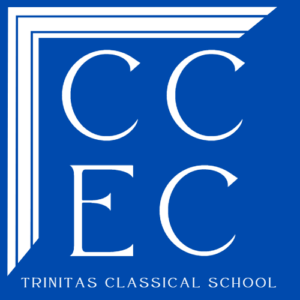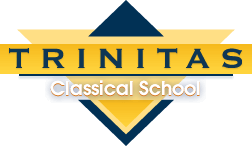 We recently held our sixteenth annual Speech Meet. While the event is a highlight for many, a few students, especially those who dread the spotlight, may wonder why this is imposed upon them each fall. A short answer is that we’re a classical school, and classical schools do things like make students get up in front of people and speak. We think it’s good for them. The Speech Meet, like Bible memory, science presentations, history reports, book club discussions, Latin at Lunchtime, and Reader’s Theater, helps build skills in rhetoric—the art of effective, persuasive, even beautiful, speaking or writing. Skills in rhetoric are something classical schools value. We value growth that comes from hard work. We value the moral imagination.
We recently held our sixteenth annual Speech Meet. While the event is a highlight for many, a few students, especially those who dread the spotlight, may wonder why this is imposed upon them each fall. A short answer is that we’re a classical school, and classical schools do things like make students get up in front of people and speak. We think it’s good for them. The Speech Meet, like Bible memory, science presentations, history reports, book club discussions, Latin at Lunchtime, and Reader’s Theater, helps build skills in rhetoric—the art of effective, persuasive, even beautiful, speaking or writing. Skills in rhetoric are something classical schools value. We value growth that comes from hard work. We value the moral imagination.
It takes hard work and perseverance to select a piece, memorize it, and polish it to the point of public presentation. For those of us who have been around for a while, it is a joy to see students grow over the years, some of them from leaning against the classroom whiteboard, fidgeting, mumbling, and forgetting their lines to confidently addressing the entire school and guests with poise and delight.
In early fall, many students (and sometimes their parents) embark on a mini literary adventure, pouring over poems and Scripture and speeches. In the process of making and interpreting their own selection and in listening to fellow student selections, they gain an appreciation for the vast range of expression in the literary landscape. We invite you on this journey and ask you to imagine briefly our students reading, reciting, listening to, and thinking about this year’s speeches.
In our various classrooms, kittens lost their mittens, a mouse went up a clock, and stars twinkled. There were lessons from Aesop — “A position earned without merit is as easily lost as gained” and “Greedy, greedy makes a hungry puppy”— and warnings to Jemima Puddle-Duck and Little Red Riding Hood not to trust a suave fox or wolf. A fly became acquainted with the dangers of a spider’s flattery. There were lessons in how to ad-dress cats, how to distinguish Bengal tigers, leopards, bears, and crocodiles, and in the necessity of courage when one goes owling in the middle of the night.
“Smart” phones were shown not to be. Roald Dahl decried the ill effects of TV on one’s imagination, “His powers of thinking rust and freeze! He cannot think—he only sees!” To keep children contented, Dahl suggests that alternative from so, so long ago: books!
Students presented works from Silverstein to Shakespeare. There were strategies for getting one’s parents to buy a pony and one’s principal to grant time off from school. There was talk of mowing the bathtub and bathing upon the grass. We heard mischievous Puck’s apology from A Midsummer Night’s Dream, Henry V’s emboldening St. Crispin’s Day Speech, and Hamlet’s great question: “To be, or not to be?”
There were inspiring tales and rousing speeches from history and literature. We heard of Paul Revere’s midnight ride across the bridge at Medford town— “A cry of defiance and not of fear. A voice in the darkness, a knock at the door, and a word that shall echo forevermore!”— and Gandalf’s battle with the Balrog at the bridge of Khazad-Dum— “You cannot pass. Go back to the Shadow! You cannot pass!”
There were speeches by queens and presidents and statesmen. Queen Elizabeth I defied Spanish tyrants and Lincoln resolved “these dead shall not have died in vain”. Churchill called for fighting on the beaches, the landing grounds, and the fields; and, Reagan asked us to consider whether “In this present crisis, government is not the solution to our problem.”
There were speeches with practical advice for life. Complaining is tiring. What should you do with a problem? Look for the opportunity in it. Negativity is a prison; it is your job to reprogram your mind. “The things that haven’t been done before, those are the things to try.” How should life be lived? With courage and by trying to understand and value those “no one cares to know.”
We were also nourished by Scripture, with recitations of Proverbs and Psalms showing us the way of wisdom and righteousness, recounting God’s lovingkindness and the fullness of His house, and making a joyful noise unto the Lord! A sixth grader’s recitation included an adaptation of the Great Commission Jesus gave his disciples: “Let’s be very clear about what I’d like you to do…Go! Go into the whole world! You’ve experienced and seen good news these past three years, so pass that on to everyone.” It is our hope that the annual speech meet is one way we help equip our students to do just that. As they learn to delight in beautiful words, may they grow ever closer to the Word.
© ALP
